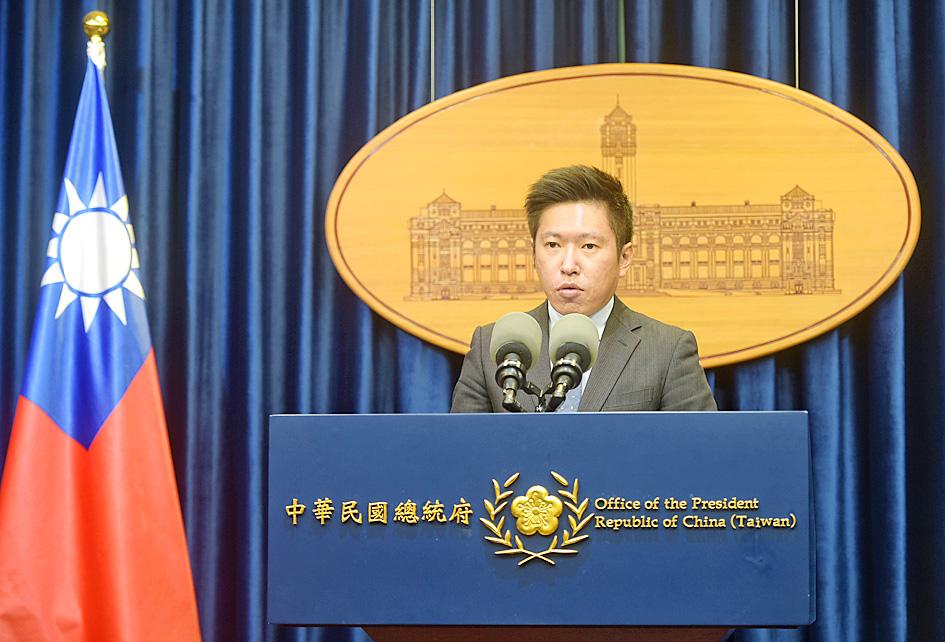President Tsai Ing-wen (蔡英文) yesterday instructed the government to bolster self-defense capabilities, improve relations with the US across party lines, and stabilize economic and social order.
The directives were issued at a National Security Council meeting, which was held earlier yesterday amid an increasing number of incursions by Chinese military planes and ahead of Tuesday’s US presidential election.
In anticipation of the Chinese Communist Party’s fifth plenum this week and the US presidential election, Tsai last month had also instructed the council to form a task force to increase intelligence gathering on possible scenarios, Presidential Office spokesman Xavier Chang (張惇涵) told a news conference in Taipei yesterday afternoon.

Photo: Chang Chia-ming, Taipei Times
During the meeting, Tsai said the nation should further modernize its defense capabilities, upgrade its asymmetric combat capabilities, promote indigenous arms development and reform its reserve forces to brace for Beijing’s military expansion and aggression, Chang quoted Tsai as saying.
Taiwan has garnered support from the majority of people and bipartisan politicians in the US, Tsai said, adding that the progress of Taiwan-US relations is obvious to Taiwanese.
She also instructed the council, the Ministry of Foreign Affairs and the Taipei Economic and Cultural Representative Office in the US to work to maintain the support of the Democratic Party as well as the Republican Party.
Tsai also asked government agencies to follow Premier Su Tseng-chang’s (蘇貞昌) instructions to improve cooperation with suppliers in key industries, make the Taiwan-US Economic and Commercial Dialogue happen, start talks over a bilateral trade agreement and resume negotiations with the US regarding the Trade and Investment Framework Agreement (TIFA).
Taiwan-US meetings about the TIFA have been suspended since 2017.
The Cabinet should take advantage of the Taiwan-US framework for strengthening basic infrastructure financing and market-building cooperation signed in September to promote supply chain cooperation in New Southbound Policy countries as well as Central and South American countries, Tsai was quoted by Chang as saying at the council meeting.
She also asked economic and financial agencies to closely monitor global economic changes after the US election, boost relief aid to industries hit hard by COVID-19 and implement major investment and infrastructure development projects.
Tsai said that stabilizing cross-strait relations is a shared interest of the two sides of the Taiwan Strait.
The two sides should discuss how to peacefully coexist based on mutual respect and understanding, she said, adding that Taiwan is willing to foster a meaningful conversation based on parity and dignity.
Hopefully, Beijing will help make such a conversation happen soon, she said.
Tsai also asked the Coast Guard Administration and police agencies to maintain social order, prevent the spread of misinformation and improve infrastructure security protection to safeguard the nation’s democracy and freedom.

Authorities have detained three former Taiwan Semiconductor Manufacturing Co (TMSC, 台積電) employees on suspicion of compromising classified technology used in making 2-nanometer chips, the Taiwan High Prosecutors’ Office said yesterday. Prosecutors are holding a former TSMC engineer surnamed Chen (陳) and two recently sacked TSMC engineers, including one person surnamed Wu (吳) in detention with restricted communication, following an investigation launched on July 25, a statement said. The announcement came a day after Nikkei Asia reported on the technology theft in an exclusive story, saying TSMC had fired two workers for contravening data rules on advanced chipmaking technology. Two-nanometer wafers are the most

Tsunami waves were possible in three areas of Kamchatka in Russia’s Far East, the Russian Ministry for Emergency Services said yesterday after a magnitude 7.0 earthquake hit the nearby Kuril Islands. “The expected wave heights are low, but you must still move away from the shore,” the ministry said on the Telegram messaging app, after the latest seismic activity in the area. However, the Pacific Tsunami Warning System in Hawaii said there was no tsunami warning after the quake. The Russian tsunami alert was later canceled. Overnight, the Krasheninnikov volcano in Kamchatka erupted for the first time in 600 years, Russia’s RIA

CHINA’s BULLYING: The former British prime minister said that he believes ‘Taiwan can and will’ protect its freedom and democracy, as its people are lovers of liberty Former British prime minister Boris Johnson yesterday said Western nations should have the courage to stand with and deepen their economic partnerships with Taiwan in the face of China’s intensified pressure. He made the remarks at the ninth Ketagalan Forum: 2025 Indo-Pacific Security Dialogue hosted by the Ministry of Foreign Affairs and the Prospect Foundation in Taipei. Johnson, who is visiting Taiwan for the first time, said he had seen Taiwan’s coastline on a screen on his indoor bicycle, but wanted to learn more about the nation, including its artificial intelligence (AI) development, the key technology of the 21st century. Calling himself an

South Korea yesterday said that it was removing loudspeakers used to blare K-pop and news reports to North Korea, as the new administration in Seoul tries to ease tensions with its bellicose neighbor. The nations, still technically at war, had already halted propaganda broadcasts along the demilitarized zone, Seoul’s military said in June after the election of South Korean President Lee Jae-myung. It said in June that Pyongyang stopped transmitting bizarre, unsettling noises along the border that had become a major nuisance for South Korean residents, a day after South Korea’s loudspeakers fell silent. “Starting today, the military has begun removing the loudspeakers,”